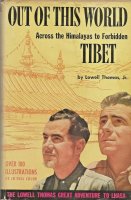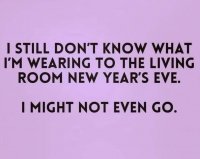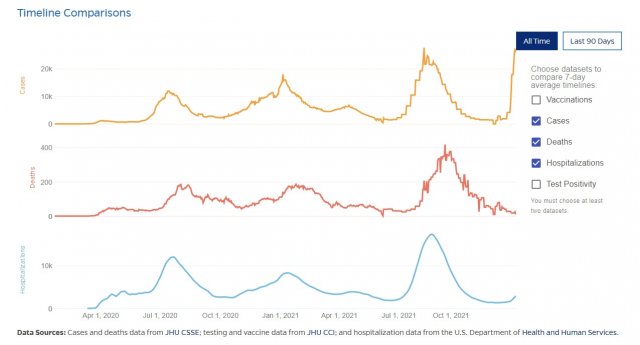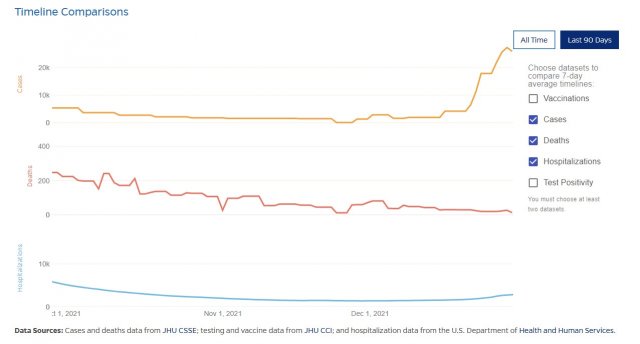I thought I'd already published my New Year's Eve post, but this heartbreaking news from Quebec demands publicity. For those who don't want to watch the 11-minute video, I've put a short summary afterwards.
Quebec has been iron-fisted from the beginning in its reaction to COVID-19, with tight lockdowns, cancellations, closures, severe restrictions on gatherings in private homes, travel bans, strong vaccine-passport requirements, and even a harsh, five-month curfew.
After much suffering on the part of the Quebec citizenry, the curfew was lifted and the choke-hold on the province's economy and family life began to ease, just a little. Enough for people and businesses to start making plans again.
Until yesterday.
That's when the provincial government announced new extrememe measures in the light of Omicron, the newest COVID variant. These include
- reinstated curfew
- take-out only for restaurants
- no private gatherings in your own home
- in-person school shut down at least until mid-January
And when do these measures take effect? At 5 p.m. today.
Today. New Year's Eve.
Now, I'm not one to go crazy on New Year's Eve. This image I found on Facebook sums it up pretty well for us these days.
But I realize that for many people the New Year's Eve festivities are important. They make plans, they travel, they spend lots of money on clothes and event tickets and parties and food and special restaurant meals. Restaurants, event venues, musicians, caterers and loads of other businesses count on this time to keep them financially afloat.
The decree comes out with one day's notice, and is clearly calculated to pull the rug right out from all New Year's Eve festivities. Plans are already made, tickets purchased, food bought, extra help hired ... then nothing. And all in fear of a COVID variant that has been producing high numbers but is almost always a mild illness with very low hospitalization and death rates.
This is not just tyrannical. It is sadistic.
I wouldn't go so far as to call it Fascist. But it is certainly Faucist.*
We cannot continue to ignore the economic, social, and mental health consequences of these extreme measures.
(Sorry this post is so depressing. My first post of the new year will be more delightful and uplifting.)
*Porter gets credit for this term, but I've latched onto it enthusiastically.
December in Florida can be interesting, weather-wise. One day we wear sweatshirts, the next shorts. Not long ago I noted that I had used the electric heater in my office and a couple of hours later turned on the air conditioning in my car. It's not unusual—and it's also not new.
It's tempting to look at our currently warm temperatures and think it a recent phenomenon. Today's high is predicted to be 84 degrees. Must be due to climate change, right?
It could be. I'm not denying that the climate changes, and we've personally seen the dramatic effects of warming on Alpine glaciers over the last 50 years. But not everything that looks like a hammer, really is a hammer. I was recently browsing through my journal from 1984—the year we moved to Florida, more than a quarter century ago—and found this entry for Friday, December 21.
Hello winter! By the calendar, of course. It's still hot here—highs in the 80's.
So, December 1984 was about the same as December 2021. I'm kind of hoping January doesn't follow the same pattern, though. This is from the entry one month later, January 21, 1985.
Brrr! Hard freeze last night. It was 23 degrees when we got up.
Experiences like this make me wish my journal hadn't eventually fallen victim to other priorities of life. I've lived long enough that it provides cultural as well as personal perspective. For the same reason I enjoy reading the journals my father kept, though he, too, left frustratingly blank years.
Speaking of years, 2022 is nearly upon us. We are finding it difficult to feel the passage of time correctly. The years 2020 and 2021 have upended our our lives, and time is out of joint. Be that as it may, we wish you all a
Happy New Year!
Permalink | Read 1095 times | Comments (0)
Category Random Musings: [first] [previous] [next] [newest]
I'm not sure why my husband insists on sharing the news he reads from major media outlets (mostly BBC News, Orlando Sentinel, National Public Radio). Perhaps he (correctly) believes I need to be better informed. Maybe he just wants someone to commiserate, in which case, well, that's part of my job. :) On the other hand, he may just like providing me with blog fodder.
In any case, what I'm hearing is a lot more sound and fury and flame-throwing than is good for my mental health. You'd think we were facing the end of the world with this Omicron COVID variant. It's true that we're hearing about a lot more cases among our friends and family these days, due I suspect to both the greater contagiousness of Omicron and the fact that people are going about their lives more freely than they were before.
I know better than to panic just because those who profit from panic are fanning the flames, but I was intrigued enough to revisit the Johns Hopkins site to see how Florida is doing, by the numbers. Here's what I found. (Click images to enlarge.)
Positive cases, deaths, and hospitalizations over all time
Positive cases, deaths, and hospitalizations over the last 90 days
Hospital bed/ICU occupancy
If you look at just the case rate, you might think something terrible is happening. But looking at the corresponding death and hospitalization rates, and the availability of hospital services, I can't see it as anything other than great news. Bear in mind that my medical "expertise" comes only from being the computer geek in a pathology research lab, and from interacting with this world for nearly 70 years. In other words, it's just my opinion. But I'm convinced that an increasing number of mild cases means we're interacting with this disease in a more natural way that could encourage it to mutate into something we can live with.
Cases are up, but deaths are down, and hospitals have plenty of room. I can handle that.
It wasn't the Christmas they expected.
The shepherds weren't expecting anything. The Wise Men (who came later) might not have been surprised that the king they were seeking was a young child, but they probably didn't expect to find him in such humble surroundings. Herod wasn't expecting him, though he certainly knew how reigning kings dealt with potential rivals: Off with their heads!
Mary (and Joseph) did know, having been clued in by an angel, but I'll bet Gabriel didn't bother to include the messy details, such as going into labor away from home, at the end of a long and difficult journey to a crowded city with limited accommodations.
Despite innumerable clues throughout their history to the coming of a savior who would put everything right—albeit less clear at the time than in hindsight, of course—the religious scholars in Israel saw nothing momentous about the events. This despite having told the above-mentioned Eastern sages that they should go to Bethlehem to look for the Messiah. As was shown some 33 years later, their ideas of "put everything right" had some major misalignments with God's own; we tend to see what we are looking for.
There's a long history of Christmas not being what people expect, so I should not have been surprised that Christmas 2021 wasn't the Christmas WE expected.
In this year's Christmas newsletter, I included this line: "Sub conditione jacobaea, we will make a fifth trip, to Connecticut, before the end of the year for another family gathering." The Latin phrase is the more formal equivalent of the Southern, "Lord willin' and the creek don't rise."
The creek rose. Or rather, COVID rose. As in, two of the people we'd planned to spend Christmas with tested positive. We reflected: (1) people who are sick do not generally welcome houseguests, (2) if one is going to get sick, home is usually the best place to be, and (3) the threat of isolation and quarantine could turn a 10-day visit into 20 or more, especially if one is flying. Then we made the painful decision to cancel the visit. :( Instead of flying out early Christmas morning, we were going to be home.
Two days before Christmas I crossed "pack suitcase" of my list and added "buy a roast for Christmas dinner." We did not have a tree, but I stopped by the Home Depot tent and picked up some of their tree trimmings to add some festive and aromatic greens to our hastily-decorated substitute:
I only drove to three places that day—the post office, Target, and Publix—but came home exhausted. As I said to Porter while he was helping me unload the car, "You'll know how crowded it was when I say I elected to wear my mask everywhere I went."
Christmas Eve wasn't as planned, either, as our pastor's wife had also come down with COVID. The CDC protocols do not require vaccinated people to quarantine, but our diocesan rules are stricter, so he was suddenly out of the picture, which cancelled some of our services and altered the others. Amazingly, they found a substitute priest for Christmas Eve and Sunday, though not for Christmas itself. Nonetheless we are grateful that the bishop didn't revoke his permission for choirs to sing without masks! All things considered, it was still a lovely service, though for us the really festive celebration had been our mid-month Lessons & Carols. (Too many of our choir members travel out of town for Christmas, for us to be able to plan anything big closer to the Day.)
Since the Christmas Eve service began well after my normal bedtime, and, unlike last year we had no children around to inspire an early arising, we slept in on Christmas Day (That is, to about 7 a.m.).
Our Christmas breakfast usually includes traditional Dutch almond raisin bread and banket. Often we order these from Vander Veens' Dutch store, but this year I convinced myself that it's cheaper and better to make them myself. (I was right.) I did buy the almond paste from Vander Veen's (much less expensive than I can find at the grocery store), but our grandson makes his own from scratch, so I might try that sometime. I doubt I'll go through the effort of making my own puff pastry, however; Pepperidge Farm does a great job with that.
No one complained that the "banket letters" were selfish this year—all I's.
The day was a quiet one, spent opening presents, talking with family, and reading. Porter read one of my Christmas present books, and I continued reading Oathbringer, which I intend to complete before the Twelve Days are over! (I'm currently 2/3 of the way through the 1200+ pages.) I did manage to cook Christmas dinner in there somewhere, and it was good (especially the gravy), but I couldn't help noting that it didn't hold a candle to my brother's Christmas roast beef, which we had been anticipating.
The Second Day of Christmas was Sunday, and we went to church. If attendance was about as expected for the day after Christmas, at least the choir did not outnumber the congregation. And we had enough choristers to sing Vivaldi's Gloria!
I hope you are all enjoying a very good Christmastide.
Even if it might not be the Christmas you planned on.
Sometimes the Babylon Bee gets it just right: Perfectly Good Cookie Dough Ruined by Putting It in the Oven.
Frankly, I'm also a fan of baked cookie dough. But I've said it before and I'll keep saying it: If our food supply is so unsafe that milk and juice must be pasteurized to be safe, if raw eggs and even raw flour are considered dangerous, and if we are continually urged to overcook our meat—then something is tragically wrong with our food supply.
Treating the symptoms must be only a stop-gap measure. We need to fix the problem, rather than condemn ourselves and future generations to inferior food.
Those who are smart and protecting themselves need to continue doing their best to protect themselves and their loved ones.
I found this in a comment on a friend's Facebook post. One advantage of information overload is that such comments quickly become "anonymized information" in my brain, protecting the innocent and the guilty alike.
What struck me about this statement, with which I heartily agree, is what it tells me about how much we are alike. We all want to protect ourselves and our loved ones, and most of us have opinions as to how best to do that.
It is in the means, not the ends, that we disagree.
Some people move to rural areas and learn to farm. Some organize and join unions. Some purchase and learn to use guns. Others choose to homeschool, or to take political action, or to stockpile food and other essentials. Some work hard to strengthen family and community ties, or to attend to their own physical fitness, or to build up a strong financial base. And some people get vaccinated against COVID-19. Many choose more than one of these paths.
The writer of the Facebook comment was specifically speaking of COVID-19 vaccination, which I certainly consider to be a valid way of choosing to protect oneself and one's family. Unfortunately, the context of the above quotation wasn't as reasonable.
I know this is callous, but those who are smart and protecting themselves need to continue doing their best to protect themselves and their loved ones. What happens to those who do not care, is no longer taking up my headspace.
Just as the excerpt epitomizes what we have in common, the context shows what is dividing us. Because by "those who do not care," the writer appears to mean those who choose not to follow his own particular choices. Possibly, he's expressing his willingness to leave them alone to make their own decisions. But the callousness, which he admits, contains the implication that he considers doing them harm to be a valid part of protecting himself.
That is very dangerous ground indeed. We can do better.
Permalink | Read 1054 times | Comments (0)
Category Hurricanes and Such: [first] [previous] [next] [newest] Health: [first] [previous] [next] [newest] Politics: [first] [previous] [next] [newest] Random Musings: [first] [previous] [next] [newest]
In the second week of Advent, my true love gave to me:
- Five days of company
- Four choir rehearsals
- Three restaurant meals
- Two Christmas parties
- And a service of Lessons and Carols.
It was fantastic—and today I slept all afternoon.
We now resume our regular life. (Hah!)
"Find Your ZZZs: How to Get the Best Sleep Every Night"
It was a two-page article in our local city newspaper—and very large print at that. So I certainly couldn't have expected anything profound. I'm only calling it out because I was struck by how inapplicable it was to me. The advice given must work for many people, because I've heard it in just about every article I've read about sleep. But one size simply doesn't fit all, and I wish that were more universally acknowledged. Here's some of the advice given:
- Set your bedtime so that you wake up at the end of a 90-minute sleep cycle Not applicable, since I'm one of the blessed people who almost never uses an alarm clock. I wake up when I wake up, and figure there's no need to worry about sleep cycles.
- 30 minutes to an hour before bedtime, turn off bright lights and put devices away "Avoiding screen time at least 30 minutes before bed is critical to your quality of sleep." That's a very common recommendation, but for me just a few minutes of reading or doing puzzles in bed is the best trick I've found for putting me right to sleep, and it doesn't matter a bit whether they're print or electronic.
- Decrease the amount of disruptive light in the room with blackout curtains or a sleep mask. This might actually be useful. Light doesn't keep me from falling asleep, but our neighbor's bright, motion-activated light does wake me up and make me wonder which of our wild animals is dancing on the lawn.
- Keep your room a cool temperature (experts suggest between 60 and 67 degrees) Right. Maybe that works for a northerner, but running the A/C that much is not in our budget. Besides, at that temperature, I'd be wearing my winter pajamas and huddling under the blankets.
- Invest in your sleep with a supportive bed and comfortable bedding You mean the mattress and box springs we got second-hand from my in-laws almost 20 years ago should be replaced? At least the author had the grace to admit that "upfront costs of a new bed may be intimidating"—as we re-discover every time we think we might do just that.
- Don't use the snooze button Not a problem, since I'm not using an alarm clock.
- Expose yourself to sunlight when you get up Hmm. I think not. Since I'm usually up a couple of hours before sunrise, that's not going to happen; it's especially hard during Daylight Saving Time.
I'm not complaining; I'm sure the article was helpful for some folks. But I do find that more and more these days people are over-generalizing when it comes to what other people are like. I guess we just need to be more aware of what truly works for us and not worry about what other people think.
Actually, I do have one complaint, I suppose: With all that advice about going to bed and waking up, they did not address the only trouble I do have with sleeping: getting back to sleep after awakening in the middle of the night! Praying is the best help with that—but only memorized prayers; if I have to think to any extent it only speeds the squirrel-wheel in my brain.
 Out of This World: Across the Himalayas to Forbidden Tibet by Lowell Thomas, Jr. (Greystone Press, 1950)
Out of This World: Across the Himalayas to Forbidden Tibet by Lowell Thomas, Jr. (Greystone Press, 1950)
This book is a legacy from cleaning out Porter's father's house. Through no fault of its own, it was a bit of a struggle to read, as its mustiness survived my attempts to clean it and reading took its toll on my upper respiratory system.
It was worth the effort.
Written in 1949 by Lowell Thomas, Jr., it is the story of his trek with his more famous father to Lhasa, the capital of Tibet, in a time when that country was almost completely closed off to foreign visitors. Arduous is not an adequate word to describe this expedition, which left me astonished at the courage and endurance of these men, not to mention the local people—and animals—who went along as translators, guides, and bearers.
The Thomases' rare admission to Tibet and almost-unheard-of admission to Lhasa were born out of desperation on the part of the Dalai Lama and other Tibetan officials. The people of Tibet, who only wanted to be left alone, were being threatened by a Chinese takeover, and they were hoping that the Thomases and their stories would raise Western awareness and get them some help. Sadly, we know how that turned out.
Nonetheless, the story is of much value, not only for their adventures, but even more for the historical and cultural insights (both Western and Tibetan).
I've always had a problem with headlines, which all too often distort or even contradict the content of the story they purport to summarize. It's similar to my frustration with book covers that make me wonder if the artist actually read the book itself. Even knowing this, it's all too easy to judge a book by its cover and to get our news from the screaming headlines. To get any useful information, we have to dig deeper.
On the other hand, it's possible that our State Department has simply gone mad.
One of Porter's travel websites led him to the handy(?) State Department website for its current travel advisories: a categorization of the world's countries into
- Level 1 Exercise normal precautions
- Level 2 Exercise increased caution
- Level 3 Reconsider travel
- Level 4 Do not travel
A glance at the associated map reveals that we consider the rest of the world to be a very, very dangerous place and should probably just stay within our own borders. There are thirteen places marked Level 1, the safest level, including Paraguay, Bhutan, Kyrgyzstan, Kuwait, the United Arab Emirates, Zambia, and Togo. Not exactly places high on my list of comfortable vacation destinations. Perhaps we should go back to The Gambia; our Gambian friends can take comfort in knowing that their country is one of those few getting our State Department's blessing, along with neighboring Senegal.
On the other hand, Switzerland is Level 4. Do. Not. Travel. More than 300 other countries are given this worst possible rating, include North Korea, Afghanistan, and the Central African Republic.
I am a lot happier that our daughter and her family are in Switzerland rather than North Korea, Afghanistan, or the Central African Republic. What do you think?
Fortunately, the website allows you to click on individual countries and get more detailed information about the advisories.
- Do not travel to North Korea due to COVID-19 and the serious risk of arrest and long-term detention of U.S. nationals.
- Do not travel to Afghanistan due to civil unrest, armed conflict, crime, terrorism, kidnapping, and COVID-19.
- Do not travel to the Central African Republic due to COVID-19, Embassy Bangui’s limited capacity to provide support to U.S. citizens, crime, civil unrest, and kidnapping.
- Do not travel to Switzerland due to COVID-19.
Methinks our State Department could do with a finer gradation of the Level 4 warning.
Here's another interesting anomaly: Liechtenstein has a travel advisory rating of Level 3. So if you can get there, you are considered safer than in neighboring Switzerland or Austria, each at Level 4. However, they make no suggestions as to how one might get to Liechtenstein without travelling through either Switzerland or Austria, given that Liechtenstein has no airport (though they do have a helipad). Perhaps one could parachute in, though that does introduce risks of its own.
I know I'm a little late for this Thanksgiving wish, since we're now well into Advent and the rest of the country is singing Christmas carols and concentrating on commerce. But on the real Thanksgiving Day we were far too busy indulging in our family's week-long celebration (my grandson's "favorite holiday of the year") to write at that time. (If it looks as if managed to keep up my blogging schedule, that's largely because I had a backlog of posts stored up for the purpose.)
Our missing persons list (always honored on the tablecloth participants sign every year) was longer than usual, but we still numbered over 30 people, and it was SO GOOD to get back to a reasonably normal life again. (If you don't count as abnormal spending most of a day trying to get a COVID-19 test when every source less than a two-hour drive away seemed to be out of stock.)
Holidays rarely retain much of their original purpose, so it's not surprising that Thanksgiving, too, has strayed far from its origins. But no amount of debunking and grinchiness will stop me from recognizing that this year marks the 400th anniversary of the First Thanksgiving. I know that that occasion was hardly unique in being a harvest festival celebration of thanksgiving to God. I know that many descendants of the original Native Americans at that feast wish that their ancestors had been a little less friendly with the Pilgrims. I know that the original looked far different from what is re-enacted in American elementary schools. I know that Thanksgiving didn't become a national holiday till Abraham Lincoln made it so.
So what? That doesn't change the fact that 400 years ago the Pilgrims, having suffered through a tremendously difficult year, gave a feast to return thanks to God for their survival, and shared that meal with their neighbors. We feast in memory of that festival, even if we don't always acknowledge it. And I want our grandchildren to know that if certain of that company had not been among those First Thanksgiving celebrants, they themselves would not be here today.
There were no decorated evergreens in Bethlehem. George Washington didn't refuse to lie to his father about a cherry tree incident. The first Easter had nothing to do with rabbits or eggs or candy. How many people really think about the birth of America on Independence Day, or about workers on Labor Day? Holidays take on a life and spirit of their own, and the alternative to enjoying them for what they are tends to be unhelpful grumbling. I will celebrate all that is good in our modern celebrations, and I will celebrate all that is good about what inspired them.
Happy 400th birthday, Thanksgiving!









